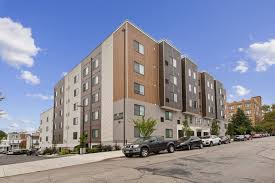Finding the perfect rental apartment can feel like searching for a needle in a haystack. With so many options available, it’s easy to become overwhelmed and unsure of where to start. Did you know New Jersey is the number one US state with 79.1% of renters?
While this data can be pretty overwhelming, with careful planning and consideration, you can streamline the process and find the ideal apartment that meets your needs and preferences. So, if you’re looking for an apartment in New Jersey, this guide is for you!
We’ll walk you through the steps to finding the perfect rental apartment, from setting your budget to signing the lease.
Go on reading!
1. Determine Your Budget
Before you start your apartment hunt, it’s essential to determine your budget. And that will depend on the location you’re choosing. As mentioned before, if you’re in New Jersey, carefully consider your monthly income, expenses, and savings to determine how much you can comfortably afford to spend on rent each month.
Experts recommend that your rent should not exceed 30% of your monthly income. Once you have a clear understanding of your budget, you can narrow down your search to apartments that fit within your price range.
2. Make a List of Must-Have Features
Next, make a list of must-have features and amenities for your ideal apartment. For instance, if you’re looking for a Jersey city apartment complex, consider factors such as location, size, number of bedrooms and bathrooms, and amenities like parking, laundry facilities, and outdoor space.
Moreover, make sure to check for pet policies since it’s something not every apartment approves of. Having a clear idea of what you’re looking for will make the apartment-hunting process much more efficient.
3. Research Neighborhoods
Once you have your budget and must-have features in mind, it’s time to research neighborhoods. Consider factors such as proximity to work or school, access to public transportation, safety, and local amenities like grocery stores, restaurants, parks, and entertainment options.
Take the time to visit different neighborhoods and explore their vibe and atmospheres to determine which ones align with your lifestyle and preferences.
4. Start Your Search
With your criteria in mind, begin your search for rental apartments. Use online apartment listing websites, rental apps, and social media groups to search for available apartments in your desired neighborhoods.
Narrow down your options based on your budget, must-have features, and preferred neighborhoods. Be sure to read reviews and ratings from previous tenants to get a sense of the quality of each apartment and its management company.
5. Schedule Apartment Viewings
Once you’ve identified a few promising apartments, schedule viewings to see them in person. During the viewing, pay attention to the condition of the apartment, including any signs of damage or disrepair.
Take note of the layout, size of rooms, natural light, storage space, and overall cleanliness. Don’t be afraid to ask questions about the rental terms, lease agreement, and any additional fees or charges associated with the apartment
6. Consider Your Commute
When evaluating potential apartments, consider your daily commute to work or school. Factor in the distance, transportation options, and traffic patterns to determine how convenient and manageable your commute will be from each location.
Keep in mind that a longer commute may impact your quality of life and overall satisfaction with your living situation.
7. Check Your Credit Score
Before applying for a rental apartment, it’s essential to check your credit score. Landlords often use credit scores to assess the financial responsibility of potential tenants. A higher credit score may increase your chances of being approved for an apartment and may also qualify you for lower security deposits or rental rates.
If your credit score needs improvement, take steps to address any outstanding debts or issues before submitting your rental application.
8. Prepare Your Documents
When applying for a rental apartment, you’ll need to provide various documents to the landlord or property management company. These may include proof of income, employment verification, bank statements, references from previous landlords, and a copy of your ID or driver’s license. Gather these documents ahead of time to streamline the application process and increase your chances of securing the apartment you want.
9. Negotiate Rental Terms
Once you’ve found the perfect rental apartment, don’t be afraid to negotiate the rental terms. This may include negotiating the monthly rent, lease duration, move-in date, or included amenities.
Be polite and respectful in your negotiations, and be prepared to compromise if necessary. Remember that landlords want to find responsible and reliable tenants, so presenting yourself in a positive light can work in your favor during negotiations.
10. Read the Lease Carefully
Before signing the lease agreement, carefully read through all the terms and conditions. Pay close attention to clauses regarding rent increases, lease renewal, maintenance responsibilities, and early termination policies.
If you have any questions or concerns, don’t hesitate to ask the landlord or seek clarification before signing. Once you’ve reviewed the lease thoroughly and are satisfied with the terms, sign on the dotted line and get ready to move into your new home!
The Bottom Line
Finding the perfect rental apartment can be a daunting task, but with careful planning and consideration, you can find the ideal place to call home.
By setting your budget, making a list of must-have features, researching neighborhoods, and carefully evaluating each apartment, you’ll be well on your way to finding the perfect rental apartment that meets your needs and preferences.
Happy apartment hunting!

